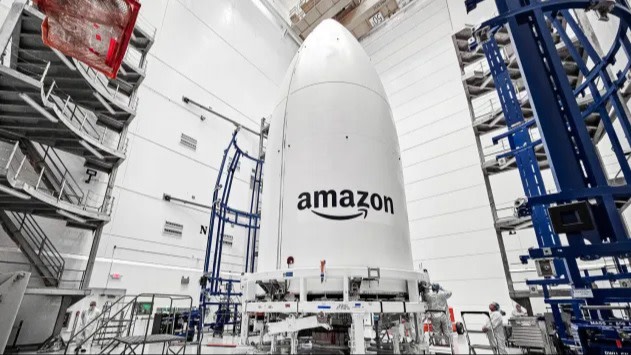Unlock the Editor’s Digest for free
Roula Khalaf, Editor of the FT, selects her favourite stories in this weekly newsletter.
Amazon’s satellite operation, Project Kuiper, is pushing ahead with plans to launch a broadband service in the UK, as the tech group founded by Jeff Bezos attempts to take on Elon Musk’s Starlink.
Kuiper is not yet operational, but has previously said it expects to begin deploying its satellite constellation in early 2025 and that it plans to roll out its broadband service later this year. It aims to compete with Starlink in low Earth orbit, a region of space where satellites can provide broadband to areas across the globe poorly served by traditional internet services.
Kuiper needs approval from the UK communications regulator Ofcom to provide broadband services across the country. A final decision on Kuiper’s licence is pending, after a consultation closed in October on Ofcom’s proposal to approve it.
Ofcom said on Sunday that it was “still considering the Amazon application for an Earth Station Network licence to allow Amazon Kuiper to operate terminals in the UK”.
Amazon has also been in talks with the UK Ministry of Defence. Filings show that last year Kuiper discussed a study it carried out on behalf of the UK Space Command. Blue Origin — Bezos’s separate space company — also had a “capability discussion”, according to transparency data published by the government department. The meetings were first reported by the Sunday Telegraph newspaper.
Amazon did not immediately respond to a request seeking comment. The MoD declined to comment.
Meanwhile, SpaceX’s Starlink is operational in more than 100 countries including the UK. A launch of satellite services by Amazon in the UK would follow an increase in demand for Musk’s broadband offering in the country. Ofcom in December reported that Starlink’s service had reached 87,000 connections across the UK — more than double the 42,000 the previous year — with the majority in rural areas.
Starlink’s satellite broadband capacity for the south-east of the country has also sold out. Its website shows it has a waiting list for new connections in a region including London, and stretching from Milton Keynes to Hastings and Andover to Canterbury.
SpaceX did not immediately respond to a request seeking comment.
In its game of catch-up with Starlink, Kuiper must first secure Ofcom’s approval for a licence for certain band frequencies that would enable the delivery of broadband from a constellation of satellites in low Earth orbit.
Ofcom said in September that Kuiper planned to “provide secure, high speed, low latency broadband services to a variety of retail and wholesale customers in the UK” including households, government — such as schools, hospitals and offices — first responders and disaster relief operators.
Kuiper’s planned satellite constellation was at the time expected to launch in the fourth quarter of 2024, with the project already having been beset by delays.
Kuiper is also eyeing direct-to-device satellite services, which would enable consumers to text, call or use data on their mobile phones. Ofcom published in November a call for views on the service, in which Amazon said it was “exploring options” for such a plan.
Kuiper added that direct-to-device services had the “potential to facilitate innovation and improve connectivity, even in the most remote parts of the UK”, and could be “especially valuable in emergency situations occurring outside of the coverage areas of terrestrial systems or following natural or man-made disasters that compromise terrestrial networks”.
Ofcom said on Sunday that it planned to consult on specific proposals to authorise direct-to-device satellite services in mobile bands in the UK early this year. “Subject to consideration of stakeholder responses and our final decisions this could enable such services to be offered to consumers later in 2025,” it added.
Additional reporting by Anna Gross in London



